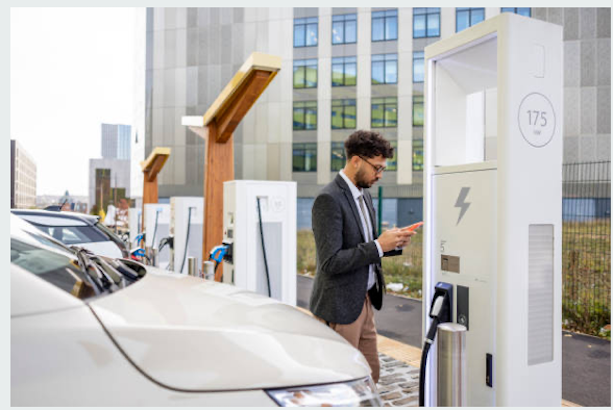Top 10 Questions and Answers About Commercial and Residential EV Charger Installation
- Mark Willis
- Oct 4, 2024
- 3 min read

1. What types of EV chargers are suitable for commercial vs. residential installations?
Residential: Most homes use Level 1 or Level 2 chargers. Level 1 uses a standard 120V outlet but charges slowly, while Level 2 requires a 240V outlet and charges faster (10-30 miles of range per hour).
Commercial: Businesses often use Level 2 chargers for workplace or customer use and DC Fast Chargers (Level 3) for rapid charging in high-traffic locations, providing 60-100 miles of range in 20 minutes. EV Fast offers tailored solutions for both homes and businesses, with expertise in installing all three levels of chargers.
2. How much does it cost to install EV chargers for homes vs. businesses?
Residential: A Level 2 charger, including installation, typically costs between $500 and $2,500, depending on electrical upgrades needed.
Commercial: The cost for Level 2 chargers ranges from $2,500 to $10,000 per charger. DC Fast Chargers can cost between $10,000 and $50,000, with additional costs for infrastructure.
EV Fast helps residential clients find cost-effective options and works with businesses to create scalable charging solutions within budget.
3. Do I need different permits for residential and commercial installations?
Residential: For most home installations, a permit is required, especially for Level 2 chargers, as the work involves modifying your electrical panel.
Commercial: Commercial installations typically require more extensive permits and inspections, as they involve higher power levels and sometimes multiple charging stations.
EV Fast manages the permitting process for both residential and commercial clients, ensuring compliance with local codes and regulations.
4. How long does it take to install EV chargers at home vs. a business?
Residential: Installing a Level 2 charger at home usually takes 2-4 hours, depending on the electrical setup.
Commercial: Installation time for commercial EV chargers can vary. For Level 2 installations, it may take a day or two, while DC Fast Charger setups can take several days or weeks, depending on the scope of the project.
EV Fast ensures efficient and timely installations for both residential and commercial clients, minimizing disruptions.
5. What is the difference in maintenance for residential and commercial EV chargers?
Residential: Home chargers require minimal maintenance, primarily involving checking for any wear and keeping the unit clean.
Commercial: Commercial chargers require more robust maintenance, particularly for high-usage stations or DC Fast Chargers.
EV Fast offers maintenance packages for both residential and commercial setups, ensuring long-term reliability and performance.
6. Can I charge multiple vehicles at home or at a business location?
Residential: Yes, you can install dual-port chargers to charge two vehicles simultaneously, though it may require an electrical panel upgrade.
Commercial: Businesses can install multiple chargers or dual-port stations to accommodate more vehicles, which is common in parking lots or fleets.
EV Fast offers solutions for both residential and commercial clients, providing scalable options to meet multi-vehicle charging needs.
7. Are there rebates and incentives for installing EV chargers at homes and businesses?
Residential: Many states and utilities offer rebates and tax credits for homeowners who install EV chargers.
Commercial: Businesses can take advantage of larger rebates, tax credits, and grants aimed at encouraging the installation of charging stations, especially in public or high-traffic locations.
EV Fast helps both residential and commercial clients navigate available incentives and apply for them, lowering the upfront costs of installation.
8. What kind of electrical upgrades might be needed for home vs. commercial EV chargers?
Residential: For a Level 2 charger, many homes may need an electrical panel upgrade to handle the increased load.
Commercial: Commercial installations may require substantial upgrades, especially for DC Fast Chargers, including power supply modifications and new circuits.
EV Fast performs a comprehensive electrical assessment for both homes and businesses to ensure the infrastructure can handle the chargers without compromising safety.
9. How do I manage usage and billing for commercial EV chargers?
Residential: Billing is simple for home chargers, as it is integrated into your electricity bill.
Commercial: Businesses often want to set pricing or track usage. EV Fast provides network management solutions that allow business owners to monitor usage, set rates, and provide seamless payment options for employees or customers.
10. Can residential or commercial EV chargers be installed outdoors?
Residential: Yes, most EV chargers can be installed outdoors, but they need to be weatherproofed.
Commercial: Outdoor installations are common for businesses, and EV chargers must meet safety standards for exposure to the elements.
EV Fast ensures that both residential and commercial outdoor installations are secure, weatherproof, and up to code, providing long-lasting performance.
By addressing these key questions, EV Fast makes EV charger installation easy and accessible for homeowners and businesses, offering expert guidance and customized solutions for every need.


Comments